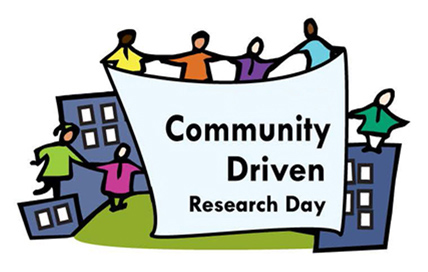HOW CAN WE HELP YOU? Call 1-800-TRY-CHOP
In This Section
Powerful Collaborations Coalesce When the Research World Meets the Real World
 Editor’s Note: Our guest blogger, Ayana Bradshaw, MPH, is the administrative director for the Center for Injury Research and Prevention and the Violence Prevention Initiative at Children’s Hospital in Philadelphia, serving in this role for the past five years. She joined CIRP in 2006 as the center coordinator for the Philadelphia Collaborative Violence Prevention Center where she was responsible for the day-to-day operations of a Centers for Disease Control and Prevention violence prevention program.
Editor’s Note: Our guest blogger, Ayana Bradshaw, MPH, is the administrative director for the Center for Injury Research and Prevention and the Violence Prevention Initiative at Children’s Hospital in Philadelphia, serving in this role for the past five years. She joined CIRP in 2006 as the center coordinator for the Philadelphia Collaborative Violence Prevention Center where she was responsible for the day-to-day operations of a Centers for Disease Control and Prevention violence prevention program.
What happens when you have community-based organizations share their expertise and bring their research questions to academic researchers throughout Philadelphia? Ideas are discussed, partnerships are formed, and collaborative research projects are launched. These are the goals of the annual Community-Driven Research Day (CDRD), now in its eighth year.
Co-organized by CHOP, the event provides a unique forum for researchers interested in community-based participatory research, which includes the basic tenet that both community and research partners are involved in all phases of research. This approach allows community capacity and related opportunities to be developed and sustained.
CDRD aims to generate collaborations between community organizations and academic researchers who can uniquely benefit from their shared capabilities and perspectives. Following the event, pilot grants are offered to jumpstart these collaborations, and many times they have resulted in successful long-term partnerships.
For example, in 2015 pilot funds supported a joint project between CDRD presenter, Camden Area Health Education Center, and Alexis Roth, PhD, MPH, assistant professor of Community Health and Prevention in the Dornsife School of Public Health at Drexel University. The research conducted during this pilot stage resulted in an American Sexually Transmitted Diseases Association's Career Development Award that will continue to support the work between these two entities in the prevention of HIV in women who are intravenous drug users.
Over the past several years, CDRD evolved based on work that was conducted through a multi-institutional Centers for Disease Control and Prevention funded project: the Philadelphia Collaborative Violence Prevention Center (PCVPC). PCVPC was founded on the principle that community members are integral to every aspect of research from the development of the research questions to the dissemination of the results back into the community.
 Members of PCVPC, including myself, visited Johns Hopkins University, where an event similar to CDRD had taken place. We decided to bring this concept to the Philadelphia community, and CHOP worked together with Temple University, the University of Pennsylvania, and Drexel University to host their first CDRD event in 2009. Now supported by the Violence Prevention Initiative at CHOP, this unique opportunity provided a space in which community organizations seeking to find academic research partners with similar research questions could do so with ease. And academic researchers who were truly dedicated to encouraging community participation in their research activities could meet community organizations that worked directly on the ground.
Members of PCVPC, including myself, visited Johns Hopkins University, where an event similar to CDRD had taken place. We decided to bring this concept to the Philadelphia community, and CHOP worked together with Temple University, the University of Pennsylvania, and Drexel University to host their first CDRD event in 2009. Now supported by the Violence Prevention Initiative at CHOP, this unique opportunity provided a space in which community organizations seeking to find academic research partners with similar research questions could do so with ease. And academic researchers who were truly dedicated to encouraging community participation in their research activities could meet community organizations that worked directly on the ground.
Although funding for PCVPC ended in 2011, I have continued to be committed to helping to spearhead this event because I truly believe in the value of having the community voice embedded in all aspects of research. The sponsoring institutions, now also including Thomas Jefferson University, have all demonstrated their commitment to community-based participatory research methods through their consecutive sponsorship of both the CDRD event and pilot funds offered each year.
Over the past eight years we have had well over 100 community-based organizations present at CDRD, and each year I am impressed by the rich wisdom that comes from these organizations that are working hand-in-hand with the Philadelphia community. By having community organizations representing the populations whom they serve stand as equal partners with academic researchers who are conducting research in these communities, the outcomes are beneficial to all involved.
So far, over 35 collaborative research projects have been funded with community partners such as Lutheran Settlement House (CHOP), New Kensington Community Development Corporation (Thomas Jefferson University), and Hepatitis B Foundation (University of Pennsylvania).
During this year’s CDRD, community-based organizations and community groups will present research questions that they are interested in answering through a poster presentation based on the theme, “Local Solutions to Health Challenges.” The event will feature keynote speaker Amy Carroll-Scott, PhD, MPH, assistant professor of Community Health and Prevention in the Drexel Dornsife School of Public Health, who will highlight the benefits of community and academic partnerships, including her success in the use of community-based participatory research methods.
The 2017/2018 CDRD will be held at Temple University Tuesday, Dec. 5, 2017.
For more information and to register to attend (deadline Nov. 21), click here.


